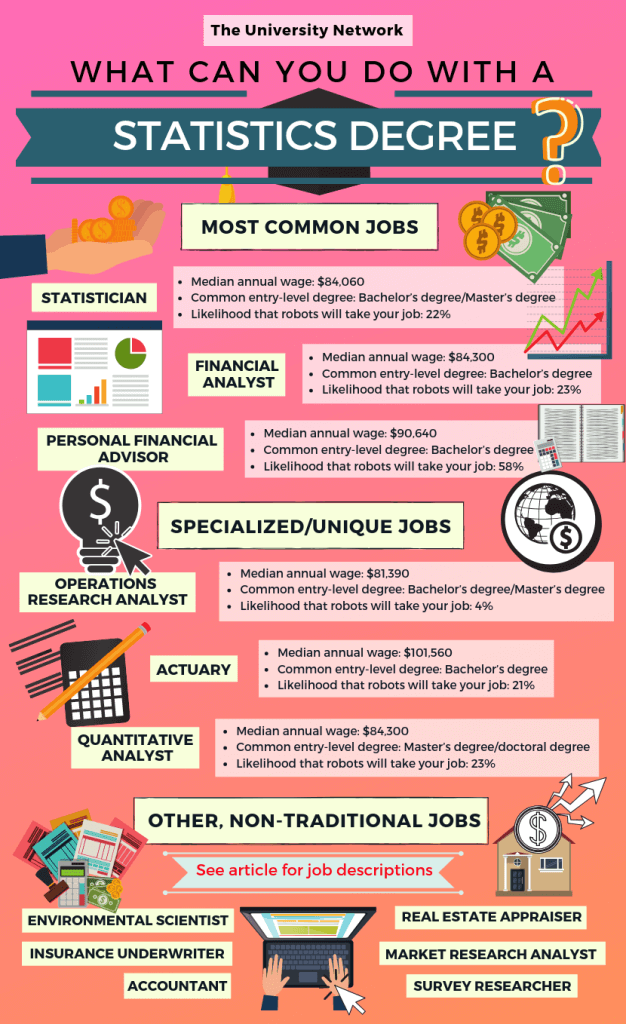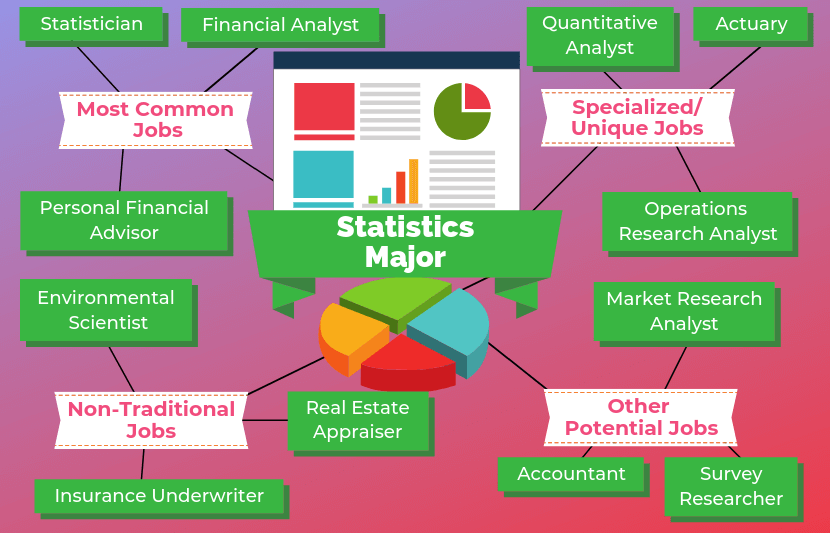Data runs the world. In virtually every field — marketing, finance, medical research, politics, etc. — data is collected and interpreted. Statisticians are trained to mine this ocean of information and use it to understand the world and its inhabitants. With the advent of the internet, data is more prevalent and freely available than ever and statisticians are in high demand across all sectors of society. As a result, it’s one of the best majors for young professionals entering the job market today.
Here is a list of 12 jobs for statistics majors:
Most Common Jobs for Statistics Majors
1. Statistician
Statisticians are employed in a variety of industries to collect and analyze data, which is used to help solve problems in business, engineering, the sciences, and other fields. A statistics degree is a perfect point of entry into this career. The level of education needed in this career depends on where you are seeking employment. Private industry jobs will typically require a master’s degree, but it is possible to find employment, oftentimes with the government, with only a bachelor’s degree.
Median annual wage: $84,060
Common entry-level degree: Bachelor’s degree/Master’s degree
Likelihood that robots will take your job:22%
2. Financial Analyst
Financial analysts are responsible for examining financial data in order to provide information and guidance to businesses or individuals on business and investment decisions. They are employed within the financial industry by investment banks and firms and outside of the financial industry by smaller banks, insurance companies, and real estate brokerages. Financial analysts regularly use statistics to examine trends in the market and individual companies’ statements to compile investment recommendations. Financial analysts typically must have a bachelor’s degree in a related field.
Median annual wage: $84,300
Common entry-level degree: Bachelor’s degree
Likelihood that robots will take your job:23%
3. Personal Financial Advisor
Personal financial advisors work with clients to discuss and meet their financial goals, providing advice on anything from investments to mortgages to retirement funds. A bachelor’s degree in mathematics or statistics with coursework in finance and economics qualify most candidates for entry into the field. Financial advisors may need licensing and certification from the Securities and Exchange Commission depending on the role and employer. Certification is typically required for positions involving stock trading and investing.
Median annual wage: $90,64
Common entry-level degree: Bachelor’s degree
Likelihood that robots will take your job:58%

Unique/Specialized Jobs for Statistics Majors
4. Operations Research Analyst
Operations research analysts are employed by a variety of organizations and businesses to analyze the organization’s general operations and identify and solve problems. They do so by mining data and performing statistical analysis of trends and sales history. They also collect other relevant information by collecting and analyzing consumer feedback and worker input. Once this information and collected, they draft reports and give presentations to managers and executives. They use an extensive knowledge of statistics, mathematics and analytical methods in their work, and so are expected to have completed coursework in those and related areas of study. Entry-level positions may be available to some bachelor’s degree holders, though employers may show a preference for candidates with master’s degrees.
Median annual wage: $81,390
Common entry-level degree: Bachelor’s degree/Master’s degree
Likelihood that robots will take your job:4%
5. Actuary
Actuaries use statistics, mathematics, and financial information and theory to assess the financial costs of risk and uncertainty. Actuaries work for a variety of businesses, and they are essential positions at financial consultancies, insurance agencies and banks. A bachelor’s degree is typically all that’s needed to enter the industry. Aspiring actuaries must also pass a series of exams to become certified in the profession. Professional actuaries should be certified through the Casualty Actuarial Society (CAS) or the Society of Actuaries (SOA). Both groups have a unique set of tests you have to pass. If you recently graduated from college and want to become an actuary, now is the time to start preparing for those tests. They can take hundreds of hours to prepare for.
Median annual wage: $101,560
Common entry-level degree: Bachelor’s degree
Likelihood that robots will take your job:21%
6. Quantitative Analyst
Statistics majors interested in working in finance might consider pursuing a career as a quantitative analyst. Quantitative analysts, or “quants,” as they are often called in the financial industry, are experts in financial securities. Quants, who are known as the rocket scientists of the financial world, are typically employed by hedge funds and investment banks, and tasked with the highly-challenging job of developing complex models that allow companies to price and trade financial securities, using their knowledge of statistics, mathematics, computer science and finance. Because of the high level of expertise required for the position and the competitive nature of the job market, most quants have a doctorate in a related field.
Median annual wage: $84,300
Common entry-level degree: Master’s degree/doctoral degree
Likelihood that robots will take your job:23%
Non-Traditional Jobs for Statistics Majors
7. Environmental Scientist
Environmental scientists study the natural environment and devise methods to protect the environment, reduce the impact of human activities on the natural world, and improve human health. They conduct research experiments and compile environmental data to assess environmental problems and convey their findings to policymakers, government officials, and businesses. While most environmental scientists have an undergraduate background in the natural sciences, they also often need a strong understanding of statistics and data collection and analysis. Statistics majors interested in becoming environmental scientists should take coursework in the natural sciences and plan on gaining at least a master’s degree in environmental science or a related natural science.
Median annual wage: $89,400
Common entry-level degree: Master’s degree
Likelihood that robots will take your job:3%
8. Insurance Underwriter
Insurance underwriters review applications for insurance and, based on their evaluation of the degree of risk, determine whether or not to provide coverage. They do so by collecting background information about applicants and assessing the risks involved in each case. Health insurance providers are interested in potential clients’ medical histories and may consult medical personnel; car insurance providers review potential clients’ driving records; home insurance providers examine the location and condition of a home. They compare each situation to statistics and data to determine the risk involved and determine a quote. Underwriters typically need a bachelor’s degree with coursework in business, finance and statistics. They often begin their careers working under the supervision of senior underwriters and work their way up to senior positions overtime. For advancement into a supervisory role, most employers require certification, which can be gained through training programs.
Median annual wage: $69,760
Common entry-level degree: Bachelor’s degree
Likelihood that robots will take your job:99%
9. Real Estate Appraiser
Real estate appraisers estimate the value of a property before it is sold, mortgaged, taxed, insured or developed. The typical tasks of a real estate appraiser generally include visiting, inspecting and photographing properties, preparing appraisal reports, and analyzing trends in the real estate market. Appraisers will typically specialize in either commercial or residential properties. There is no specific degree requirement to become a real estate appraiser, though most employers look for candidates with a bachelor’s degree in business, finance, statistics, or a related subject.
Median annual wage: $54,010
Common entry-level degree: Bachelor’s degree
Likelihood that robots will take your job:90%
Other Jobs for Statistics Majors
10. Market Research Analyst
Market research analysts are employed by a company or a marketing firm to study market conditions for a particular product or service. Market researchers spend their days researching, monitoring and forecasting marketplace trends by gathering data on consumer behavior and analyzing market data. They also help develop marketing strategies and campaigns for their clients or company. The field is increasingly data-driven, so it’s a perfect career choice for statistics students. Market research analysts typically need a bachelor’s degree in market research, statistics, or mathematics. A graduate degree is typically not necessary for entry-level positions, but provides opportunities for advancement into leadership roles.
Median annual wage: $63,230
Common entry-level degree: Bachelor’s degree
Likelihood that robots will take your job: 61%
11. Accountant
Accountants keep track of, analyze and archive an organization’s financial information. Depending on the size of the organization, accountants are also sometimes asked to give advice on how an organization should budget, spend and invest its money. Nearly every organization needs accountants, including hospitals, nonprofits, insurance firms, and more. Many accountants also regularly use statistics to analyze trends, estimate risk, and create forecasts. After completing a bachelor’s degree, aspiring accountants should become state-certified by passing the Certified Public Accountant exam, which is administered by the American Institute of Certified Public Accountants.
Median annual wage: $69,350
Common entry-level degree: Bachelor’s degree and CPA license
Likelihood that robots will take your job: 94%
12. Survey Researcher
Survey researchers create surveys and analyze survey data. Working variously in research organizations, polling organizations, nonprofits, corporations, and government, survey researchers devise survey questions based on background research, conduct interviews, collect data, and interpret the results. Educational requirements vary based on the position and employer. As with most research jobs, survey research positions may require a graduate degree in a quantitative field, such as survey research, statistics, or mathematics. Some entry-level positions may be open to bachelor’s degree holders.
Median annual wage: $54,270
Common entry-level degree: Bachelor’s degree/Master’s degree
Likelihood that robots will take your job:23%
10 Famous People Who Studied Statistics
- Leo Breiman, statistician
- Gertrude Cox, statistician
- Bradley Efron, statistician
- James Goodnight, businessman & software developer
- Trevor Hastie, statistician
- Dipak C. Jain, university administrator & statistician
- Story Musgrave, physician & astronaut
- Charles Simonyi, business executive
- John Tukey, statistician
- Alan Walters, economist
To explore options for other majors, click here.



